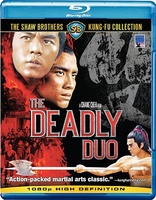The Deadly Duo Blu-ray Movie
HomeThe Deadly Duo Blu-ray Movie 
雙俠 / Shuang xiaTokyo Shock | 1971 | 81 min | Not rated | May 11, 2010
Movie rating
6.5 | / 10 |
Blu-ray rating
| Users | 0.0 | |
| Reviewer | 3.0 | |
| Overall | 3.0 |
Overview
The Deadly Duo (1971)
During the Sung Dynasty in Northern China, a prince is taken prisoner in order to prevent a Southern uprising. A group of martial-arts heroes come to his aid. However, the prince is heavily guarded and early rescue attempts fail. Now it's up to two kung-fu experts Ti Lung (DRUNKEN MASTER 2) and David Chiang (THE HEROIC ONES) to use their extraordinary skills to rescue the prince and restore hope for the future of China.
Starring: David Chiang, Lung Ti, Ku Feng, Bolo Yeung, Kang-Yeh ChengDirector: Cheh Chang
| Foreign | Uncertain |
| Martial arts | Uncertain |
| Action | Uncertain |
| Period | Uncertain |
| Adventure | Uncertain |
Specifications
Video
Video codec: MPEG-4 AVC
Video resolution: 1080p
Aspect ratio: 2.35:1
Original aspect ratio: 2.35:1
Audio
English: Dolby Digital 5.1 (448 kbps)
English: LPCM 2.0 (48kHz, 16-bit)
Mandarin: LPCM 2.0
Mandarin track is 48kHz, 16-bit
Subtitles
English
Discs
25GB Blu-ray Disc
Single disc (1 BD)
Packaging
Slipcover in original pressing
Playback
Region A (B, C untested)
Review
Rating summary
| Movie | 4.0 | |
| Video | 3.5 | |
| Audio | 3.0 | |
| Extras | 1.5 | |
| Overall | 3.0 |
The Deadly Duo Blu-ray Movie Review
Anybody know how many Samurai it takes to cross a bridge?
Reviewed by Dustin Somner June 12, 2010Directed by Cheh Chang, The Deadly Duo is a 1971 kung-fu film set in the Sung Dynasty. Starring two of the most renowned actors working in the Shaw Brother’s studio system during the early 1970’s (David Chiang and Ti Lung), the film offers a simplistic plot that merely serves as a set-up for the abundant violence on display. In fact, one could easily conclude that The Deadly Duo is kung-fu cinema in its purest form, combining the noble ideals of historical Chinese civilization with expansive sequences that are filled to the brim with action carnage. If you’re searching for a perfect opportunity to test the waters in the vintage martial arts genre, this is a good place to start.
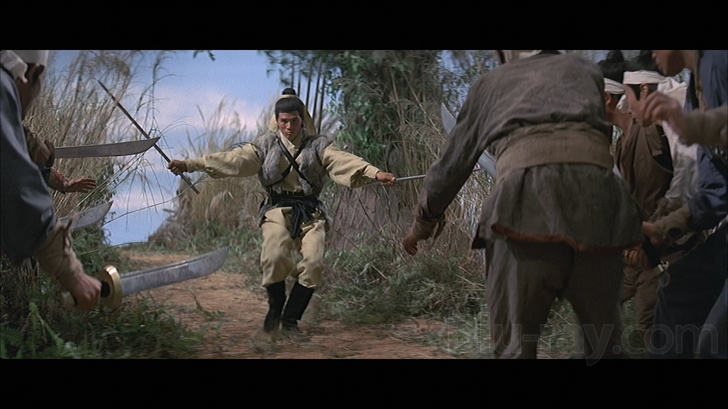
Someone's about to get some ketchup on his shirt...
Following the kidnapping of a noble prince in the Northern region of China, a dwindling band of patriots embark on a rescue mission to free their master and escort him to the territories of his comrades in the south. Leading the mission is master swordsman Pao Kung Tien (Ti Lung), who learns of the location where the prince is being held from a captured soldier he and his band rescued. Unfortunately, knowing the location proves to be of little help, considering the only way into the heavily guarded compound is over a crumbling wooden bridge. Knowing none of his men are skilled enough to traverse such an obstacle, Tien travels to a local village in search of an expert “lifter”, who may be able to help his men across. At the same time, the chief guard responsible for the protection of the prison compound sends his own party to meet with the renowned lifter, and acquire his services before the rescue party reaches him. This results in a triangle battle between the two warring factions that seek the service of the lifter, and ends with the renowned expert lying dead on the floor (not much use to either side anymore). Thankfully, Tien’s arrival just happened to coincide with a visit by the lifter’s old training partner (David Chiang), who proves just as skilled as the deceased warrior. It doesn’t take Tien long to acquire the services of his newfound friend, earning them the title designation “Deadly Duo”. Now all that stands between them and the unlawfully imprisoned prince is a rickety bridge, and approximately one thousand soldiers. Not bad odds for a couple of kung-fu masters.
Those of you who read my recent review of The Heroic Ones will recall my disenchanted reaction to several elements in that production, which I found decidedly non-heroic. The Deadly Duo was released one year later (1971), and included the re-teaming of director Cheh Chang with actors Ti Lung and David Chiang (the three men often collaborated together on films within the Shaw Brothers studio system). Unlike The Heroic Ones, this particular outing contains better pacing, an even tone, a compelling story, and slightly better acting from the main players and their supporting cast. In many ways I consider The Deadly Duo one of Cheh Chang’s better works, since he set out with a clearly defined purpose, and avoids the incorporation of forced comedy. This allows the tone of the film to follow the direction of the plot, and maintain a brisk pace throughout the relatively short runtime.
If you’re reading this review, I’d imagine one of your primary interests is centered on the fight choreography and stunt-work throughout the film. As a longtime fan of kung-fu cinema, I’ve witnessed my fair share of thrilling martial arts spectacles, and The Deadly Duo ranks somewhere toward the middle. The primary element holding it back from a more compassionate assessment is an early fight sequence at the site of a large scale execution, where a group of patriots battle it out with a hoard of soldiers. Sadly, this is one of the weaker scenes I’ve witnessed, showing a typically formidable Ti Lung completely out of his element (almost as if he’s not trying very hard). I’m guessing the massive nature of the choreography (with literally one hundred men fighting at once) didn’t leave much room for practice, so you’ll notice multiple stunt men half-heartedly twirling a staff or jumping around for no apparent reason simply because they don’t have someone to fight at a certain moment in time. Thankfully, matters take a dramatic turn for the better when David Chiang steps into the picture, leaving at least half of the film with excellent fight sequences full of realistic choreography (it would seem Ti Lung performs better when he has a companion fighter battling next to him).
The Deadly Duo Blu-ray Movie, Video Quality 

Presented in 1080p utilizing the AVC codec (at an average bitrate of 18Mbps), The Deadly Duo looks surprisingly good for a film of this vintage. Fine object detail won't compare with a flashy modern production, but judging from the textures on facial close-ups or the intricacies within the ornate costumes, it's not difficult to notice the enhancements on this high-definition release. Unfortunately, not everything is roses and sunshine with this newly minted transfer, which allows edge halos to plague a large number of distance shots, lending an artificially sharp characteristic to the presentation of some scenes (this is likely the unfortunate byproduct of trying to glean detail where there is none). From a coloring standpoint, we're given a natural palette filled with rich reds, yellows, and blues that collectively create a visually arresting experience. That's not to say there aren't occasional scenes that appear less spectacular (or even dull), but those sequences are few and far between. Moving right along, black levels offer sufficient depth, allowing contrast to deliver a striking level of shade differentiation across the image, while separating elements in the foreground and background with ease. With the exception of the aforementioned edge enhancement, there's no appreciable artifacting, aliasing, or other digital anomaly to otherwise detract from the overall experience.
The Deadly Duo Blu-ray Movie, Audio Quality 
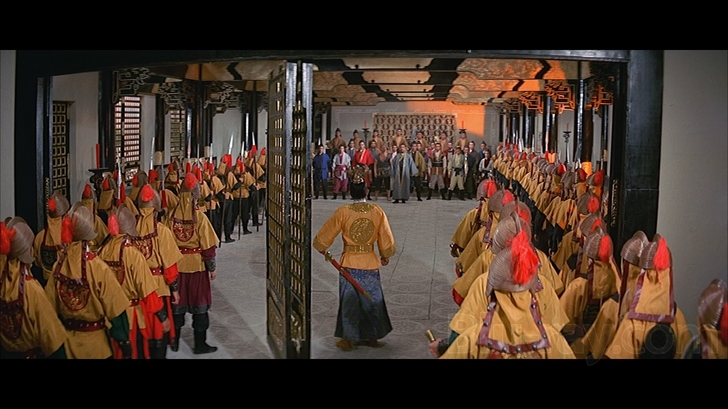
On the audio side of the coin, Tokyo Shock has provided three serviceable options that won't blow your socks off, but accurately reproduce the outdated audio techniques commonly used in the genre. When I refer to outdated effects, I'm simply pointing to the use of cheesy clapping noises to simulate landed blows, or the common practice of infusing generic metal-on-metal sounds during blade battles (which sound oddly similar to the swinging of a rusty gate). These effects coupled with the spaghetti western soundtrack create a collective experience that may seem cheesy to those with little familiarity in the kung-fu genre, but provide a certain level of comfort to long-time fans. Most subtitle haters are probably interested in the difference between the lossless 2.0 track versus the lossy 5.1 option (only available as the English dub), so I'll put those inquiries to rest by simply saying there's not much surround separation on either option. The Dolby Digital track rarely creates any manner of immersion, registers with a noticeable drop in volume, and lacks the crisp nature of the lossless option. In the end, the preferable tracks contained in this release are the lossless versions, which display equal proficiency regardless of your preference.
The Deadly Duo Blu-ray Movie, Special Features and Extras 
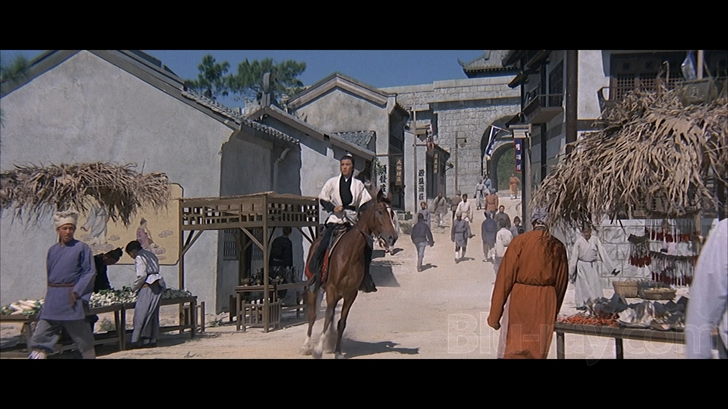
Elegant Trails with David Chiang (480p, Dolby Digital 2.0, 8:02 min): Presented in Chinese with English subtitles, this interesting featurette provides a modern-day recap of Chiang's career in kung fu cinema.
Elegant Trails with Ti Lung (480p, Dolby Digital 2.0, 9:27 min): Similar to the prior supplement, this segment includes a lengthy (and candid) interview with Lung, who describes his eventual rise to stardom within the Shaw Brothers studio system.
Stills Gallery (480p, Dolby Digital 2.0, 3:16 min)
Rounding out the supplements, we have two trailers for The Deadly Duo (standard definition), and a collection of trailers for other releases from Tokyo Shock (Heroes Two, The Master, Tokyo Gore Police, Challenge of the Masters).
The Deadly Duo Blu-ray Movie, Overall Score and Recommendation 
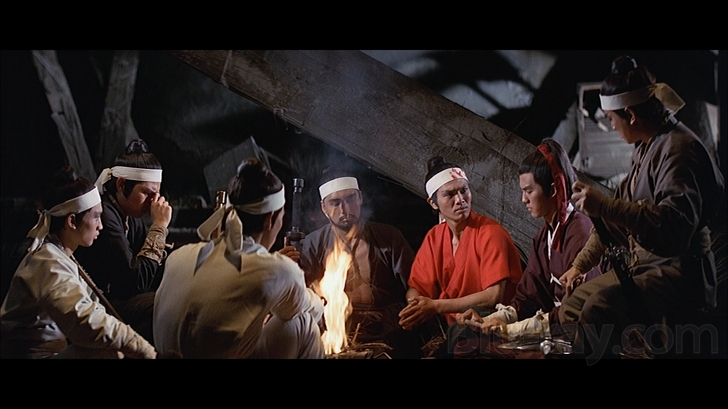
The Deadly Duo is a wonderful example of the fun-factor waiting to be discovered in the kung-fu genre. Between the daring rescue plot, competent fight choreography, and the charisma of the two male leads, the film ranks toward the top of Cheh Chang's work for the Shaw Brothers Studio, and remains a recognized classic in a genre often overlooked by western audiences. If you're a longtime kung-fu fan, this certainly deserves a spot in your Blu-ray collection.
Similar titles
Similar titles you might also like

Tai Chi Hero
Tai Ji 2: Ying Xiong Jue Qi
2012

Heroes Two
方世玉與洪熙官 / Fang Shiyu yu Hong Xiguan
1974

Little Big Soldier
大兵小將 / 大兵小将 / Dà Bīng Xiǎo Jiàng
2010

True Legend
Su Qi-Er
2010

The 36th Chamber of Shaolin
少林三十六房 / Shao lin san shi liu fang
1978

All Men Are Brothers
Dong kai ji
1975

Dragon Inn
龍門客棧 / Long men kezhan
1967

Tai Chi Zero
Tai Chi 0
2012

Ip Man 3 4K
2015

The Angry Guest
E ke / 惡客
1972

Five Element Ninjas
五遁忍術 / Ren zhe wu di
1982

Young Detective Dee: Rise of the Sea Dragon
2013

Brotherhood of Blades II: The Infernal Battlefield
绣春刀II:修罗战场 / Xiu chun dao 2: Xiu luo zhan chang
2017

The Heroic Ones
Shi san tai bao
1970

The Delightful Forest
Kuai huo lin / Fai wut lam / 快活林
1972

Martial Arts of Shaolin
Nan bei Shao Lin / 南北少林
1986

The 8 Diagram Pole Fighter
1984

Police Story III: Supercop 4K
警察故事3超級警察 / Gíng chaat gu sih sāam: Chīu kāp gíng chaat | Standard Edition
1992

The Duel
Da jue dou / 大決鬥
1971

Operation Condor 2
The Armour of God / Lung hing foo dai
1986
